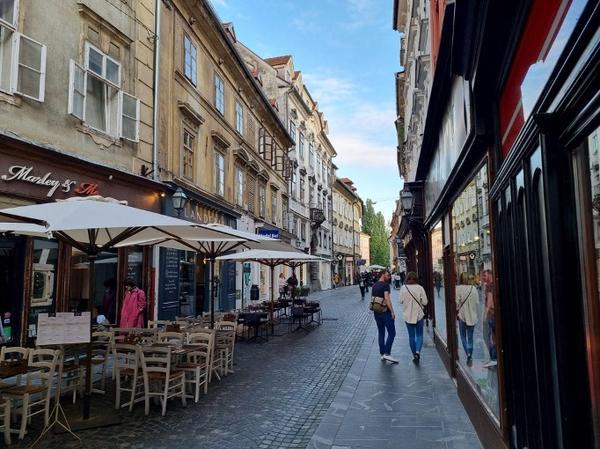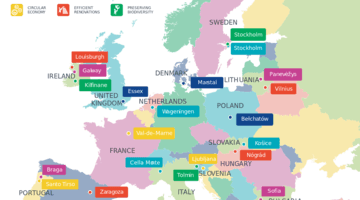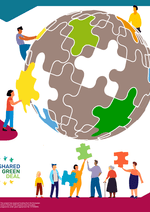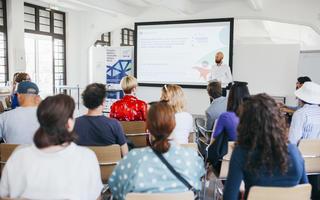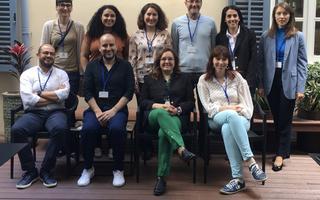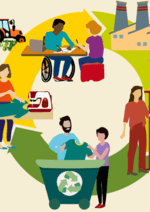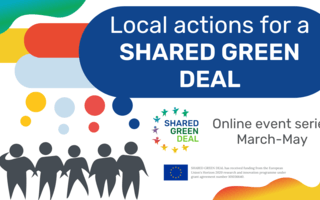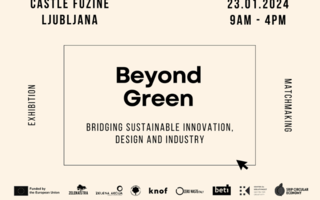Industry 4.0 and circular economy in Ljubljana
The experiment aims to transform the fashion ecosystem by promoting sustainability, driving innovation through usage of new technologies and digitalisation, development of sustainable circular business models, educating consumers and fostering collaboration. It will establish a Local Accelerator Hub (LAH) to engage and support local fashion businesses and designers in adopting circular economy practices. Therefore, the social experiment will contribute to position Ljubljana as a pioneer in the field of sustainable fashion in the long-run.
Local context
Ljubljana, the capital of Slovenia, provides a vibrant local context for this social experiment, combining its rich cultural heritage with a growing interest in sustainable textile and fashion. In addition, Ljubljana already has a relatively thriving textile/fashion scene, with a strong emphasis on local designers and independent brands.
The City of Ljubljana recognises the environmental and social impact of the textile industry and aims to address it through various initiatives. These may include promoting local and sustainable fashion brands, preventing waste, encouraging recycling, and upcycling practices, organising educational workshops and events, and fostering collaboration between different stakeholders in the sector.
Technology Park Ljubljana (TPLJ), a municipally-owned organisation focused on tech, startup and scaleup communities, is piloting this social experiment.
Specific needs and challenges
TPLJ will with the help of external experts identify local needs and challenges and co-create solutions supported by digitalisation to develop a more sustainable textile sector in Ljubljana in five fields.
- First, in the field of Sustainable Material Sourcing, one challenge is to identify and source sustainable materials for textile/fashion production. Finding alternative fibres, fabrics, and dyes that are environmentally friendly, ethically sourced, and socially responsible is crucial to reduce the sector's ecological footprint.
- Second, in the field of Design for Circular Systems, shifting from linear to circular systems requires rethinking product design and manufacturing processes. Designing garments and accessories with recyclability, durability, and repairability poses a challenge that demands collaboration between designers, manufacturers, researchers as well as other relevant stakeholders.
- Third, in the field of Consumer Awareness and Behaviour Change, educating consumers about the benefits and importance of sustainable fashion and circular economy practices is vital. Encouraging conscious buying habits, promoting garment care, and facilitating clothing recycling and upcycling initiatives are among the necessary actions to drive consumer behaviour change.
- Fourth, in the field of Collaboration and Knowledge Exchange, creating a collaborative ecosystem that brings together stakeholders from academia, industry, government, and civil society is crucial. Building strong networks and platforms for knowledge exchange, innovation, and sharing best practices can accelerate the adoption of circular economy principles in the textile/fashion sector.
- Fifth, in the field of Scaling Up Sustainable Initiatives, transitioning the textile/fashion sector towards circular economy practices requires scaling up sustainable initiatives. This involves addressing scalability challenges, securing funding for innovative projects, and ensuring the long-term viability of circular business models.
Overcoming these needs and challenges will require a multidisciplinary approach, combining technological advancements, design thinking, policy support, consumer engagement, and cross-sector collaboration. The experiment aims to address these challenges and contribute to the sustainable transformation of the textile/fashion sector in Ljubljana by fostering innovation, knowledge-sharing, and stakeholder engagement.
Detailed description of the experiment
The social experiment will establish a Local Accelerator Hub (LAH) for sustainable fashion and circular economy practices in the textile industry. The hub will serve as a platform for collaboration, knowledge-sharing, and support for local fashion businesses and designers in adopting circular economy principles and practices.
The experiment will begin with stakeholder workshops and meetings to map current practices, identify challenges, and develop circular business solutions. These workshops will involve fashion entrepreneurs, designers, researchers, consumers, disabled and visually impaired individuals, local communities, policymakers, and financial institutions.
Furthermore, the experiment will gather good practices and initiatives in the textile/fashion sector, both locally and internationally, and build a knowledge repository. This repository will provide guidance, case studies, and resources for stakeholders interested in transitioning towards sustainable and circular fashion practices.
Throughout the experiment, various activities will be organized, including seminars, webinars, training programs, and networking events to educate and engage stakeholders. These activities will raise awareness about sustainable fashion, showcase innovative solutions, and foster collaboration and partnerships.
The conclusion of the experiment will include a local circular business award to recognize and celebrate collaborative ideas and sustainable circular economy practices in the textile/fashion sector. This award will encourage and incentivize local businesses and designers to embrace circularity and contribute to the transformation of the fashion ecosystem in Ljubljana.
Local engagement
The target group of the experiment includes various stakeholders, such as fashion entrepreneurs, designers, researchers, consumers, disabled and visually impaired individuals, local communities, policymakers, and financial institutions.
Researchers, innovators, and designers will contribute their expertise and collaborate with other stakeholders to develop and implement sustainable solutions. Consumers will be educated and engaged through awareness campaigns, workshops, and events to drive behavior change and promote sustainable fashion choices.
Policymakers will be involved in advocating for supportive policies, regulations, and incentives that promote sustainable practices in the textile/fashion sector. Financial institutions can play a role in supporting innovative projects and circular business models through funding and investment opportunities.
The experiment aims to create a collaborative ecosystem where different stakeholders can come together, share knowledge, exchange ideas, and work towards a common goal of transforming the fashion ecosystem in Ljubljana.
Partners
The experiment is implemented by Technology Park Ljubljana (TPLJ) in collaboration with Centre Rog, a creative hub that fosters artistic and cultural activities. TPLJ will provide the necessary resources, expertise, and coordination to facilitate collaboration and drive the experiment's success. Centre Rog will contribute its community-focused approach, creative energy, and network to engage local stakeholders and promote sustainable fashion practices.
The experiment will also involve collaboration with local businesses, organizations, authorities, research institutions, non-governmental organizations (NGOs), and other relevant actors in the textile/fashion sector. These partnerships will enable knowledge sharing, resource mobilization, and the creation of a vibrant and circular textile/fashion ecosystem in Ljubljana.
Local partner
Technology Park Ljubljana
Country
Slovenia
Number of inhabitants
288,359
City
Ljubljana
Website/social media
Contact person:
Majda Potokar, MSc (Project manager)
majda [dot] potokar [at] tp-lj [dot] si
Aleš Pevc (Head of Technology Office, Creative technologies and new business models developer)
ales [dot] pevc [at] tp-lj [dot] si
May/June 2023
Preparatory phase 1: Development of LAH implementation plan
Jun/Jul/Aug 2023
Preparatory phase 2: Mapping potential LAH members and stakeholders
May 2023 - May 2024
Knowledge repository of the LAH: 25 good practices/programs
Monthly
Participation in virtual meetings and roadmap building
Sep/Oct 2023
Workshop 1
Oct/Nov 2023
Workshop 2
Related Green Deal Priorities
TIMELINE
Case Study Guides
|
Find out more


CONTACT
For further details please contact co-leads Professor Chris Foulds (chris.foulds@aru.ac.uk) and Professor Rosie Robison (rosie.robison@aru.ac.uk).

This project has received funding from the European Union’s Horizon 2020 research and innovation program under grant agreement No 101036640. The sole responsibility for the content of this website lies with the SHARED GREEN DEAL HAS project and does not necessarily reflect the opinion of the European Union.
